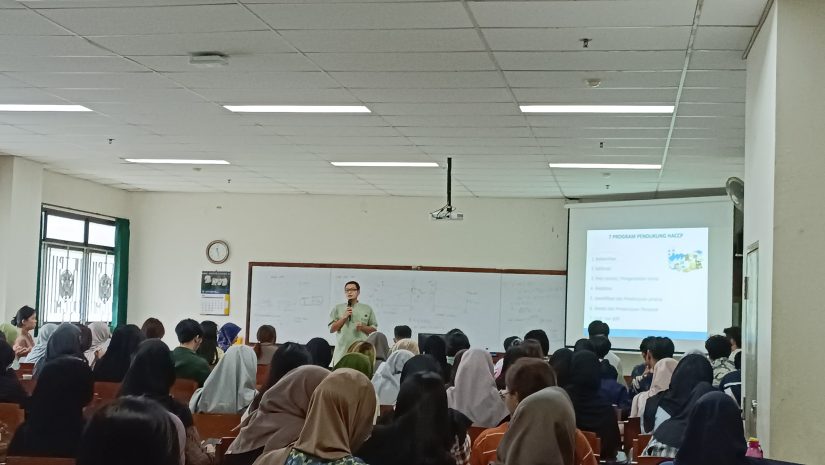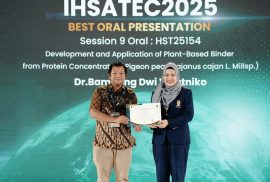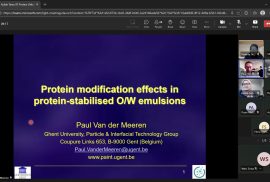
Aditya Putra Nugraha, Release Manager East Factory PT Sari Husada and an alumnus of Food and Agricultural Product Technology (TPHP) UGM class of 2004, returned to his alma mater as a guest lecturer in the Food Industry Sanitation course on Monday (21/04). This guest lecture is a mandatory session for students who have enrolled in this course.
Drawing from his experience in the Quality Food Safety Department at PT Sari Husada, Mr. Aditya delivered a comprehensive lecture on sanitation practices within the dairy industry. A key focus of his lecture was hygiene management, a crucial component of the seven prerequisite programs supporting the Hazard Analysis and Critical Control Points (HACCP) system.
He began the lecture by explaining the definition and purpose of cleaning, laying the groundwork for students to understand the broader context of food sanitation. He then explained the various areas in a dairy processing plant that require a general cleaning. These include surfaces that contact with product, such as milk pipelines, processing machines, knives, and worktables–as well as surfaces touched by workers, like glassware, door handles, walls, and floors. Additionally, he highlighted areas susceptible to microbial growth, including workers’ clothing, cleaning tools, and water traps.
Mr. Aditya also elaborated on the types of soils commonly found in dairy processing and the appropriate cleaning methods for these soils. For instance, milk fat, a kind of stubborn soil that requires alkaline substances to dissolve. He presented a detailed explanation of industrial cleaning and disinfection steps, which typically involve pre-cleaning, alkaline circulation, water rinsing, acid circulation, and final rinse.
Mr. Aditya also presented various cleaning agents commonly used in the food industry, such as alkaline solutions for killing bacteria and removing protein, fat, and sugar residues. In contrast, acidic substances are used to destroy spores. To enhance students’ understanding, the lecture concluded with an animated video illustrating the cleaning process in a visual and accessible way.
This guest lecture provided students with practical insights into the implementation of hygiene and sanitation standards in the food industry, with a particular focus on dairy processing. Beyond reinforcing theoretical knowledge, the session helped strengthen students’ readiness to face real-world challenges in food safety.
This activity also aligns with the United Nations Sustainable Development Goals (SDGs), particularly Goals 3: Good Health and Well-being, 4: Quality Education, and 9: Industry, Innovation, and Infrastructure, by promoting high-quality education, the application of sanitation technologies, and sustainable food safety practices.
Written by: Firstnandita K




